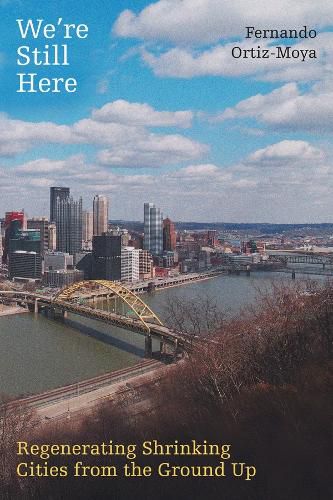Readings Newsletter
Become a Readings Member to make your shopping experience even easier.
Sign in or sign up for free!
You’re not far away from qualifying for FREE standard shipping within Australia
You’ve qualified for FREE standard shipping within Australia
The cart is loading…






In a world where cities drive economic growth and attract millions of people every year, there's something unnerving about the phrase "shrinking cities." But thousands of cities worldwide are getting smaller-leaving behind vacant homes, abandoned factories, and oversized infrastructure. Shrinking cities pose a new problem for urban planners: how to manage the transition to a smaller population with a tool kit designed for expansion.
Urbanist Fernando Ortiz-Moya argues that instead of chasing regrowth, cities can embrace their smaller size and build on their unique character and history to enhance life for those who remain. From Pittsburgh to Manchester to Kitakyushu, We're Still Here contrasts official responses to shrinkage with spontaneous bottom-up actions led by traditionally marginalized residents. These stories show how decline becomes a springboard for social and physical (re)construction and justice-driven urbanism-revealing both the limits of pro-growth planning and the seeds of a new approach that he calls "(re)city-making." Far from a cautionary tale, this book makes a convincing case for the shrinking city as a laboratory for innovative, people-centered urban policy and collective empowerment.
$9.00 standard shipping within Australia
FREE standard shipping within Australia for orders over $100.00
Express & International shipping calculated at checkout
In a world where cities drive economic growth and attract millions of people every year, there's something unnerving about the phrase "shrinking cities." But thousands of cities worldwide are getting smaller-leaving behind vacant homes, abandoned factories, and oversized infrastructure. Shrinking cities pose a new problem for urban planners: how to manage the transition to a smaller population with a tool kit designed for expansion.
Urbanist Fernando Ortiz-Moya argues that instead of chasing regrowth, cities can embrace their smaller size and build on their unique character and history to enhance life for those who remain. From Pittsburgh to Manchester to Kitakyushu, We're Still Here contrasts official responses to shrinkage with spontaneous bottom-up actions led by traditionally marginalized residents. These stories show how decline becomes a springboard for social and physical (re)construction and justice-driven urbanism-revealing both the limits of pro-growth planning and the seeds of a new approach that he calls "(re)city-making." Far from a cautionary tale, this book makes a convincing case for the shrinking city as a laboratory for innovative, people-centered urban policy and collective empowerment.